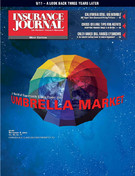The industry braced itself for the onslaught of Hurricane Charley, which hit the coast of Florida Aug. 13, leaving behind piles of rubble and an estimated $7.4 billion bill for insurers to foot, according to the Insurance Information Institute. Remarkably, Charley, which took an unexpected turn at the last minute, ravaging the coastal counties of Lee and Charlotte, fell second only to 1992’s Hurricane Andrew as the costliest hurricane in U.S. history.
The Category 4 storm claimed approximately 25 lives and destroyed more than 10,000 homes, the hardest hit being south Florida’s abundant mobile home parks. However, changes in building codes after Hurricane Andrew in 1992 proved vigilant for structures build after Andrew, according to risk modeling firm AIR Worldwide. Things could have been far worse, said AIR wind engineer Dr. Atul Khanduri in a press release. AIR estimated that had Charley hit the Tampa Bay area as originally forecast, insured losses could have exceeded $15 billion.
Charley’s aftermath kept insurers on their toes as they quickly assembled teams of representatives to assist in the storm-stricken area. The catastrophe was the industry’s favorite topic, only to be followed by the news of federal lawmakers’ draft legislation of The State Modernization and Regulatory Transparency Act (SMART). For some in the industry, the news is good; others are more wary of the potential Act’s implications. As it stands, the bill, if enacted, would end state approval of insurance rates, and in turn, require all states to adopt a competitive rating system for most types of insurance.
What the Act did not include was any mention of a federal insurance regulator, or the creation of an optional federal charter. But depending on how far this draft legislation goes, it is clear that any further action in favor of the bill can be construed as a step (albeit small) towards federal legislation.
Shortly after the introduction of SMART, industry associations weighed in with their comments. The Property Casualty Insurers of America (PCI)’s Carl Parks, senior vice president of federal government affairs, said in a statement, “We are pleased to see that discussion draft encompasses our shared goal of improving the regulatory environment—especially personal lines regulation—through a greater reliance on competitive markets.” Parks also pointed out some areas of concern, including a provision calling for market conduct examinations to be completed based on a fixed arbitrary schedule.
Despite the optimistic opinions of large insurers and agencies, many smaller agencies remain conflicted about the prospect of federal regulatory modernization. Either way, there is certain to be some controversial times on the horizon.
Topics Legislation Windstorm Hurricane
Was this article valuable?
Here are more articles you may enjoy.


 Fla. Commissioner Offers Major Changes to Citizens’ Commercial Clearinghouse Plan
Fla. Commissioner Offers Major Changes to Citizens’ Commercial Clearinghouse Plan  Munich Re Unit to Cut 1,000 Positions as AI Takes Over Jobs
Munich Re Unit to Cut 1,000 Positions as AI Takes Over Jobs  Viewpoint: Runoff Specialists Have Evolved Into Key Strategic Partners for Insurers
Viewpoint: Runoff Specialists Have Evolved Into Key Strategic Partners for Insurers  Florida Engineers: Winds Under 110 mph Simply Do Not Damage Concrete Tiles
Florida Engineers: Winds Under 110 mph Simply Do Not Damage Concrete Tiles 


